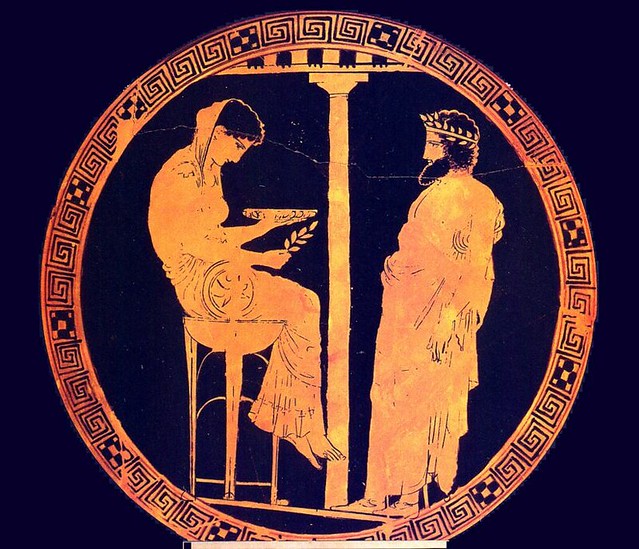The joyful, anti-didactic spirit of Ovid’s Metamorphoses has always been close to my heart. As I have come across a new, modern translation by Charles Martin, I have decided to reread this timeless classic. I always remembered that Shakespeare loved it, which I think says a lot. What is palpable in the way Ovid orchestrates his “mock epic” is the trickster spirit. The narrator seems to jump from one story to the next without any warning but always with a lot of gusto. The most famous Greek myths are retold in a fascinating and playful manner. In the translator’s introduction, Charles Martin quotes Italo Calvino from his Six Memos for the New Millennium, where he describes what he calls “the manifold text, which replaces the oneness of the thinking ‘I’ with a multiplicity of subjects, voices and views of the world.” There is a multiplicity of characters in Metamorphoses, shapeshifting and transforming all the time, but there is a continuity and oneness in this multitude. In book XV called “Prophetic Acts and Visionary Dreams,” Ovid devotes a lot of space to the teachings of Pythagoras. In the following passage (Ovid quoting Pythagoras) it is easy to see what it is that binds Metamorphoses into a unified, meaningful whole:
“Everything changes and nothing can die, for the spirit wanders wherever it wishes to, now here and now there, living with whatever body it chooses, and passing from feral to human and then back from human to feral, and at no time does it ever cease its existence; and just as soft wax easily takes on a new shape, unable to stay as it was or keep the same form, and yet is still wax, I preach that the spirit is always the same even though it migrates to various bodies.”
Translated by Charles Martin
As an interesting synchronicity, I came across an alternative translation of the passage above while reading something completely unrelated: an article dedicated to an accomplished British translator of Proust – C.K. Scott Moncrieff. He was a precocious child, who at the age of thirteen translated the very same passage of Metamorphoses in a fabulous way, I think:
“Everything is changed but nothing perishes. The spirit wanders, going hence, thither, coming thence, hither and takes possession of any limbs it pleases. With equal ease it goes from beasts into human bodies and from us into beasts, nor in any length of time does it fail. And as wax is easily moulded in new shapes, nor remains as it had been before, nor keeps the same form, but yet is itself the same; so do I teach that the soul is ever the same, but migrates into different shapes.”

Illustration from George Sandys’ Ovid’s Metamorphoses Book XIV, via http://ovid.lib.virginia.edu/sandys/bk14start.htm












thank you for this post… an excellent return to the timeless inspiration of Ovid.
LikeLike
Thank you.
LikeLike
Hi Monika,
Sounds like a really good read.I have just downloaded the sample to my Kindle. Thanks for the post!
Debra
LikeLike
About to do the same,Debra and Monika! Thanks for the nudge back to Ovid…
LikeLiked by 1 person
Always a good idea! Thanks, Anne.
LikeLike
Thank you, dear Debra.
LikeLike
Reblogged this on lampmagician.
LikeLike
Nice post, Monika. I confess that I never read Ovid … yet. Definitely on my “to-read” list. Cheers!
LikeLiked by 1 person
Time to take a break from Blake? Just joking. Thanks, Jeff.
LikeLike
LMAO! Well, there is one more poem in Songs of Innocence and Experience. I will cover that one, then focus attention on some other poets for a while. I like closure, so I want to finish this collection. My daughter gave me her collection of Emily Dickinson works that she read at college, so maybe some of those soon 😉
LikeLiked by 1 person
I found another translation in English by A.S. Kline. Kline is a British translator and poet who is still alive. His biography is in this link here:
http://wikilivres.ca/wiki/A._S._Kline
The PDF is here and it has all the original illustrations from 1640 George Sandys translation:
Click to access Ovid-Metamorphosis.pdf
Here’s a link for just the illustrations Virgil Solis:
http://www.latein-pagina.de/ovid_illustrationen/virgil_solis/inhalt.htm
Monika, thanks for this excerpt and again, for the wonderful engraving and explanation.
LikeLike
Yes, I have come across that translation, too. It seems more like prose, matter-of-fact, not so poetic. I just love the last two links you shared. beautiful. Thank you.
LikeLike
You’re welcome. The illustrations are there too, and what I like is the big print. I’m still getting the one you recommended though, thanks.
LikeLiked by 1 person